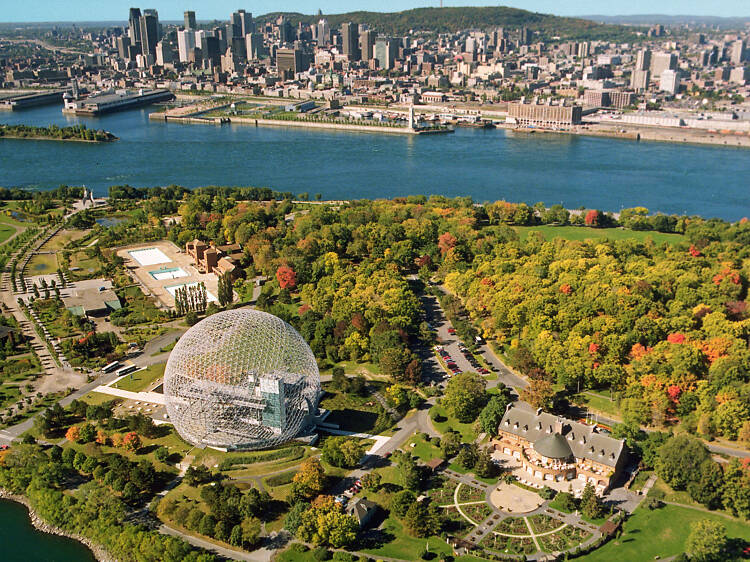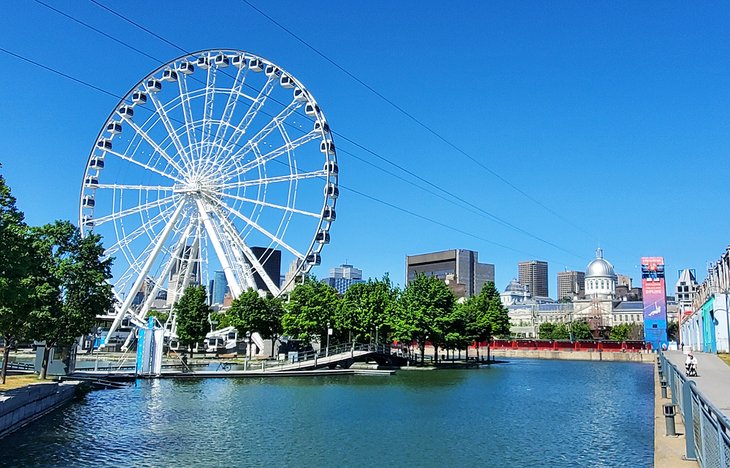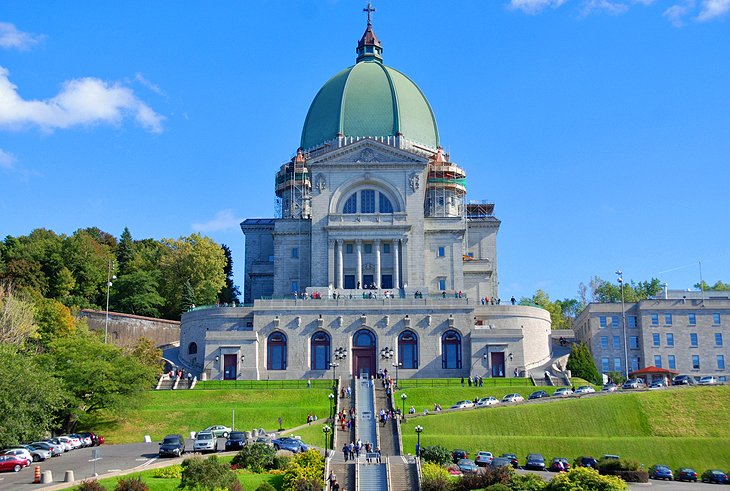
Montreal, a vibrant metropolis nestled on an island in the St. Lawrence River, is a city that effortlessly blends old-world European charm with a dynamic, modern spirit. From its cobblestone streets and historic architecture to its world-class culinary scene and thriving arts community, Montreal captivates visitors with its unique personality. This article will guide you through the city’s top attractions, delve into its rich history, offer practical travel tips, suggest accommodation options, explain transportation networks, and pinpoint the best times to experience its magic.
A Journey Through Montreal’s Rich History
Montreal’s story is as layered and complex as its urban landscape. Its origins trace back to the indigenous peoples who inhabited the area for thousands of years. In 1642, French colonists, led by Paul de Chomedey, Sieur de Maisonneuve, established Ville-Marie, a mission intended to convert Indigenous peoples to Catholicism. This marked the beginning of European settlement and the city’s enduring French heritage.

Related Articles about Montreal: A Tapestry of Culture, History, and Urban Charm:
- Germany: A Tapestry of History, Culture, and Unforgettable Adventures
- Barcelona’s Beckoning: A Comprehensive Guide to the Catalan Capital’s Top Attractions
- Madrid: A Symphony of Art, History, and Vibrant Life – Your Essential Guide to the Spanish Capital
- Japan: A Tapestry of Tradition and Tomorrow – Your Ultimate Guide to Exploration
- The Ultimate Travel Guide to London: A City of History, Culture, and Endless Discovery
Over the centuries, Montreal grew into a significant fur trading post and later a crucial industrial and commercial hub, particularly during the British colonial era. The city’s bilingual nature – a proud testament to its French and English roots – became a defining characteristic. The 20th century saw Montreal flourish as a major cultural and economic center, hosting the 1967 World’s Fair (Expo 67), a transformative event that put the city on the global stage. While facing economic challenges in the latter half of the century, Montreal has since revitalized, embracing its unique identity and re-emerging as a leading destination in North America.
Top Attractions: Unveiling Montreal’s Gems
Montreal boasts a wealth of attractions catering to every interest. Here are some of its most iconic and unmissable spots:
1. Old Montreal (Vieux-Montréal): A Step Back in Time
No visit to Montreal is complete without exploring Old Montreal. This historic district is a living museum, with its cobblestone streets, gas lamps, and meticulously preserved 17th and 18th-century architecture.
- Notre-Dame Basilica: This stunning neo-Gothic Roman Catholic basilica is a masterpiece of ecclesiastical architecture. Its breathtaking interior, adorned with intricate woodwork, vibrant stained-glass windows, and a celestial ceiling, is a sight to behold. Don’t miss the AURA light show, a captivating multimedia experience that illuminates the basilica’s grandeur.
- Place Jacques-Cartier: This lively public square is the heart of Old Montreal. Bustling with street performers, artists, caricaturists, and sidewalk cafes, it’s the perfect spot to soak in the atmosphere and enjoy a leisurely afternoon.
- Old Port of Montreal (Vieux-Port de Montréal): Stretching along the St. Lawrence River, the Old Port offers a wide array of activities. Take a scenic cruise, ride the Grande Roue de Montréal (Ferris wheel) for panoramic city views, visit the Montreal Science Centre, or simply enjoy a stroll along the waterfront.
- Pointe-à-Callière, Montreal Archaeology and History Complex: This fascinating museum is built on the very site where Montreal was founded. It offers an immersive journey through the city’s history, from its Indigenous origins to its modern-day evolution, with captivating archaeological discoveries.
- Rue Saint-Paul: This is one of the oldest streets in Montreal, lined with charming boutiques, art galleries, and restaurants housed in historic buildings.

2. Mount Royal Park (Parc du Mont-Royal): The City’s Green Lung
Designed by Frederick Law Olmsted (also known for Central Park in New York City), Mount Royal Park offers an urban oasis with stunning views of the city.
- Kondiaronk Belvedere: This iconic lookout point provides the most famous panoramic vista of Montreal’s skyline, especially breathtaking at sunset.
- Beaver Lake (Lac aux Castors): A picturesque spot for a leisurely stroll, picnicking, or ice skating in winter.
- Tam-Tams: On Sundays during warmer months, Mount Royal Park comes alive with the rhythmic drumming of the Tam-Tams, a spontaneous gathering of drummers and onlookers.
3. Plateau Mont-Royal: Bohemian Charm and Vibrant Life
This trendy and diverse neighborhood is known for its colorful row houses with iconic spiral staircases, independent boutiques, lively cafes, and vibrant street art.
- Parc La Fontaine: A beautiful urban park with a lake, fountains, and performance spaces, perfect for relaxing and people-watching.
- Rue Saint-Denis and Avenue Mont-Royal: These bustling streets are filled with unique shops, bookstores, vintage stores, and an eclectic mix of restaurants and bars.
4. Museums and Galleries: A Cultural Feast
Montreal is a haven for art and culture enthusiasts.
- Montreal Museum of Fine Arts (Musée des beaux-arts de Montréal): Canada’s oldest art museum, it boasts an impressive collection spanning various eras and cultures, from ancient to contemporary art.
- Musée d’art contemporain de Montréal (MAC): Dedicated to contemporary art, this museum showcases innovative and thought-provoking works by Quebec, Canadian, and international artists.
- McCord Museum: This museum focuses on Canadian social history, offering insights into the lives of Montrealers from past to present through its extensive collections of photographs, costumes, and artifacts.
5. Olympic Park (Parc Olympique): A Legacy of the Games
The site of the 1976 Summer Olympics, this area is a testament to architectural ambition.
- Montreal Tower: The world’s tallest inclined tower, offering breathtaking views from its observation deck.
- Biodome: A unique ecological museum housing five distinct ecosystems of the Americas, allowing visitors to experience diverse flora and fauna in recreated natural environments.
- Insectarium: A fascinating place to discover the world of insects.
- Botanical Garden: One of the world’s largest botanical gardens, featuring themed gardens and greenhouses that showcase an incredible diversity of plant life.
6. Underground City (RESO): A City Beneath the City
Montreal’s extensive underground network, known as RESO, connects major shopping malls, metro stations, hotels, offices, and cultural venues. It’s a lifesaver during harsh winter weather and a convenient way to navigate downtown.
7. Jean-Talon Market and Atwater Market: Culinary Delights
Immerse yourself in the vibrant local food scene at these bustling public markets. Sample fresh produce, local cheeses, artisanal products, and delicious Quebecois specialties.
Travel Tips for a Seamless Montreal Experience
- Language: Montreal is officially a French-speaking city, but English is widely spoken, especially in tourist areas. Learning a few basic French phrases (Bonjour, Merci, S’il vous plaît) will be greatly appreciated.
- Currency: The currency is the Canadian Dollar (CAD).
- Tipping: Tipping is customary in restaurants (15-20%), bars, and for taxi drivers.
- Electricity: Canada uses Type A and Type B electrical outlets (same as the US). Voltage is 120V.
- Safety: Montreal is generally a safe city. Exercise common sense and be aware of your surroundings, especially in crowded areas.
- Pace Yourself: Montreal offers so much to see and do. Don’t try to cram too much into one day. Embrace the city’s relaxed pace and savor each experience.
- Embrace the Festivals: Montreal is known as the "City of Festivals." Check the local calendar for events happening during your visit – there’s always something exciting going on!
Accommodation Options: Finding Your Perfect Stay
Montreal offers a diverse range of accommodation to suit every budget and preference.
- Luxury Hotels: Found primarily in the downtown core and Old Montreal, these hotels offer impeccable service, elegant amenities, and prime locations.
- Boutique Hotels: Scattered throughout various neighborhoods, these offer unique character, personalized service, and often a more intimate atmosphere.
- Mid-Range Hotels: Abundant in downtown and surrounding areas, these provide comfortable stays with good amenities at reasonable prices.
- Budget-Friendly Hostels: Popular among backpackers and solo travelers, hostels are concentrated in areas like the Plateau and downtown, offering dorm rooms and private options.
- Vacation Rentals (Airbnb, VRBO): A great option for families, groups, or those seeking a more local experience, with apartments and houses available in diverse neighborhoods.
Neighborhoods to Consider:
- Old Montreal: For a romantic and historic experience, but can be pricier.
- Downtown: Convenient for business travelers and those wanting to be close to major attractions and shopping.
- Plateau Mont-Royal: For a bohemian vibe, charming streets, and proximity to lively cafes and shops.
- Mile End: A hip and trendy area known for its independent spirit and excellent food scene.
Transportation: Getting Around Montreal with Ease
Montreal boasts an efficient and integrated public transportation system.
- Montreal Metro (STM): The subway system is the most efficient way to get around the city. It’s clean, safe, and connects most major attractions. Purchase an OPUS card for easy fare loading.
- Buses (STM): The bus network complements the metro, reaching areas not served by the subway.
- BIXI Bikes: Montreal’s popular bike-sharing system is a fantastic way to explore the city, especially during warmer months. There are numerous stations throughout the city.
- Taxis and Ride-Sharing: Taxis and services like Uber are readily available, offering convenient door-to-door transportation.
- Walking: Many of Montreal’s most charming neighborhoods, particularly Old Montreal and the Plateau, are best explored on foot.
- Driving: While possible, driving in Montreal can be challenging due to traffic and limited parking, especially in the downtown core and Old Montreal.
Best Time to Visit Montreal: Experiencing the Seasons
Each season in Montreal offers a unique charm and a different set of experiences.
- Spring (April-May): The city awakens from its winter slumber. Parks begin to bloom, outdoor cafes start to open, and the weather becomes pleasant for exploring. It’s a good time for fewer crowds and blooming gardens.
- Summer (June-August): This is peak season, with warm temperatures, long daylight hours, and an abundance of festivals and outdoor events. The city is vibrant and buzzing with energy. Be prepared for larger crowds and higher prices.
- Autumn (September-October): Arguably the most beautiful time to visit. The fall foliage paints the city in stunning hues of red, orange, and gold, particularly on Mount Royal. The weather is crisp and cool, perfect for exploring.
- Winter (November-March): Montreal transforms into a winter wonderland. While cold, the city offers unique winter activities like ice skating, snowshoeing, and a vibrant indoor arts and culture scene. The Montreal en Lumière festival is a major highlight.
In conclusion, Montreal is a city that invites exploration and promises unforgettable experiences. Its rich history, captivating attractions, diverse culture, and welcoming spirit make it a must-visit destination. Whether you’re wandering through the historic streets of Old Montreal, enjoying the panoramic views from Mount Royal, or indulging in its world-renowned culinary delights, Montreal will undoubtedly leave an indelible mark on your heart. Plan your trip, embrace the adventure, and discover the magic of this enchanting Canadian metropolis.





